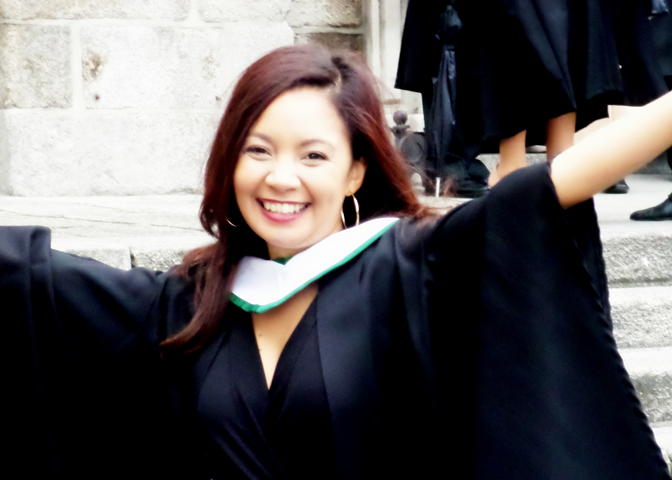Justine van Rooyen
(South Africa)
MSc in Global Health, Trinity College Dublin
Justine graduated from the 2013-14 MSc in Global Health at Trinity College Dublin with support from an Irish Aid Kader Asmal Fellowship award.

Coming from the developing world, I doubted myself a lot coming to this course, I wondered if I would be able to keep up, but I was pleasantly surprised. The course has given me a new element of self-belief.
Before the fellowship, my post was Media and Publications Officer for the AIDS Foundation South Africa. I especially worked on developing publications – writing and doing interviews with beneficiaries in remote areas to bring the programme alive with their real experiences – but with an NGO you never do just one thing. I would also help anywhere my skills could assist, so I was also involved with areas such as proposal writing, research and training.
I have a subject background in psychology and did further study on gender and sexuality. At the AIDS Foundation we often work with marginalised groups – such as lesbian, gay, bisexual, transgender and intersex groups - and their challenges with access to healthcare. I was always interested in inclusivity and social exclusion and what drew me to the Global Health course is that it looks at barriers to marginalised groups, it looks at healthcare systems around the world and how equitable they are. In South Africa there is a huge gap between rich and poor. A lot of the work the AIDS Foundation does is to try and bring healthcare services to marginalised populations to bridge the gap.
The make-up of students on the course is like a global pool of different experiences, concepts, ideas and systems - it feels like the whole world is represented. My background is not really clinical and we have doctors, nurses, physiotherapists – a huge mix and wealth of expertise to draw from.
Coming from the developing world, I doubted myself a lot coming to this course, I wondered if I would be able to keep up, but I was pleasantly surprised. The course has given me a new element of self-belief. Also I wasn’t someone before to really work in teams, I’d tend to go and find somewhere quiet and do my work on my own. I’ve now learnt to value working within a group and the expertise I can get from other people. I’ve gained listening skills and how to incorporate different ideas into a full project.
As part of the course there’s a module called ‘Perspectives of Global Health’ which brings in all kinds of backgrounds and experts – anthropological, biomedical, psychological – it gives you a different lens to look at issues every single week. That course was dynamic.
On another module we looked at monitoring and evaluation and log-frames and all that practical stuff you need at an NGO. It was so amazing. I was thinking ‘I can use all of this when I go back to my work’. Also on the course we’ve been looking at information systems and it has really shown how you can use technology effectively to save time in preparing reports. When I think of the actual programmes we have at my organisation, I think ‘This is so applicable’. It’s a very practical course – they want people to go back to the developing world and make an impact. We think about things critically and analytically but we also get all these baskets of skills, one after the other.
I was looking at statistics recently for Mzumbe, an area of rural KwaZulu-Natal, where where a very low percentage of people had access to clean running water and you look at absurd statistics like that in this day and age and it shows the inequitable distribution compared to urban populations in South Africa, who are light years ahead. It’s a complex issue but I hope, as a country, we can make we make a significant impact on a more equitable distribution of resources, priorities and services in the years ahead. A start has been made, but we need to do so much more.
Thinking about my future career, I hope to be able to make a significant difference. That’s my ultimate goal. It doesn’t matter what title I have, that’s not what it’s about. It’s about being able to see impact on the ground, that it’s made a difference, especially in the area of HIV/AIDS in South Africa where there’s the highest prevalence in the world. There’s a lot to be done.